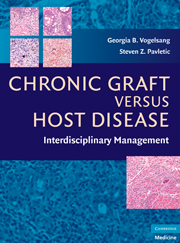Book contents
- Frontmatter
- Contents
- List of Contributors
- Preface
- PART I GENERAL PRINCIPLES
- PART II CLINICAL MANAGEMENT
- PART III ORGAN SITE OR SYSTEM-SPECIFIC MANIFESTATIONS
- 16 Cutaneous Manifestations of Chronic Graft versus Host Disease
- 17 Oral Chronic Graft versus Host Disease
- 18 Chronic Ocular Graft versus Host Disease
- 19 Gynecological Manifestations of Chronic Graft versus Host Disease
- 20 Gastrointestinal and Hepatic Manifestations of Chronic Graft versus Host Disease
- 21 Chronic Graft versus Host Disease and the Lung
- 22 Hematologic Complications of Chronic Graft versus Host Disease
- 23 Neurological Manifestations of Chronic Graft versus Host Disease
- 24 Rehabilitation Evaluation and Treatment of Patients with Chronic Graft versus Host Disease
- 25 Infections
- 26 Endocrine and Metabolic Effects of Chronic Graft versus Host Disease
- 27 Other Manifestations of Chronic Graft versus Host Disease
- 28 Psychosocial Issues in Chronic Graft versus Host Disease
- 29 Secondary Malignancies and Other Late Effects
- 30 Health-Related Quality of Life (HRQOL) in Chronic Graft versus Host Disease
- PART IV SPECIAL CONSIDERATIONS IN CHRONIC GVHD
- Index
- Plate section
28 - Psychosocial Issues in Chronic Graft versus Host Disease
from PART III - ORGAN SITE OR SYSTEM-SPECIFIC MANIFESTATIONS
Published online by Cambridge University Press: 26 August 2009
- Frontmatter
- Contents
- List of Contributors
- Preface
- PART I GENERAL PRINCIPLES
- PART II CLINICAL MANAGEMENT
- PART III ORGAN SITE OR SYSTEM-SPECIFIC MANIFESTATIONS
- 16 Cutaneous Manifestations of Chronic Graft versus Host Disease
- 17 Oral Chronic Graft versus Host Disease
- 18 Chronic Ocular Graft versus Host Disease
- 19 Gynecological Manifestations of Chronic Graft versus Host Disease
- 20 Gastrointestinal and Hepatic Manifestations of Chronic Graft versus Host Disease
- 21 Chronic Graft versus Host Disease and the Lung
- 22 Hematologic Complications of Chronic Graft versus Host Disease
- 23 Neurological Manifestations of Chronic Graft versus Host Disease
- 24 Rehabilitation Evaluation and Treatment of Patients with Chronic Graft versus Host Disease
- 25 Infections
- 26 Endocrine and Metabolic Effects of Chronic Graft versus Host Disease
- 27 Other Manifestations of Chronic Graft versus Host Disease
- 28 Psychosocial Issues in Chronic Graft versus Host Disease
- 29 Secondary Malignancies and Other Late Effects
- 30 Health-Related Quality of Life (HRQOL) in Chronic Graft versus Host Disease
- PART IV SPECIAL CONSIDERATIONS IN CHRONIC GVHD
- Index
- Plate section
Summary
OVERVIEW: PSYCHOSOCIAL ISSUES IN CHRONIC GRAFT VERSUS HOST DISEASE
Chronic graft versus host disease (cGVHD) is a serious late complication of allogeneic (allo-) hematopoietic stem cell transplantation (HSCT) and the leading cause of nonrelapse deaths more than 2 years after allo-HSCT. Patients who develop cGVHD have an increased risk of death from complications of cGVHD and its treatment and have an impaired quality of life. cGVHD increases the risk of serious medical conditions such as hypothyroidism, osteoporosis, cardiopulmonary problems, and neurological deficits.
HSCT is one of the most stressful treatments in modern cancer care. Changes in life, the impact of long-lasting treatment, and side effects are the greatest sources of stress. Onset of cGVHD further lengthens the treatment window for patients following HSCT. Patients' and caregivers' lives remain disrupted, recovery is delayed, and physical and psychological side effects increase. cGVHD has an unpredictable course with waxing and waning symptoms, unpredictable organ involvement and treatment response, and side effects that may become permanent.
Treatments for cGVHD, such as long-term administration of corticosteroids, photopheresis, calcineurin inhibitors, and other immunosuppressants, can have variable efficacies that contribute to the uncertainty of the disease course. These treatments are associated with physical and psychological side effects that can be more devastating than cGVHD itself.
A number of descriptive studies have reported the longterm consequences and effects of allo-HSCT on quality of life, but few studies have tested interventions to treat negative psychosocial sequelae.
- Type
- Chapter
- Information
- Chronic Graft Versus Host DiseaseInterdisciplinary Management, pp. 314 - 325Publisher: Cambridge University PressPrint publication year: 2009



